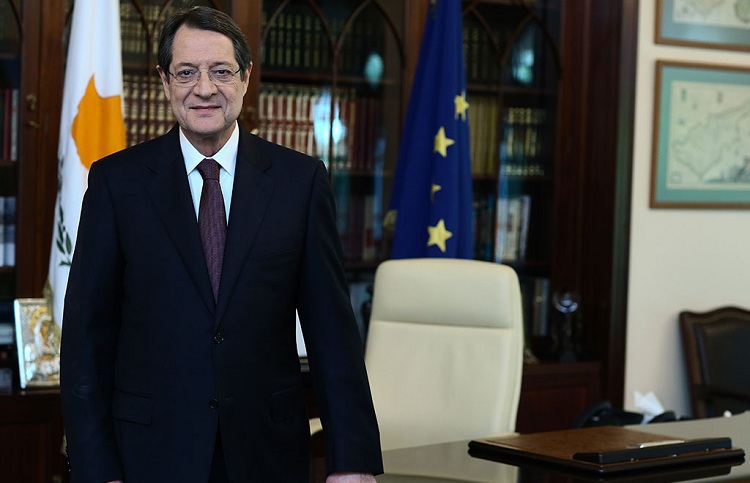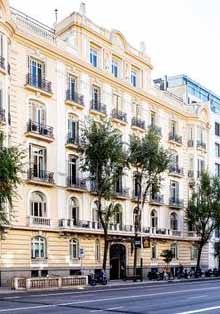The Diplomat
The President of Cyprus, Nikos Anastasiadis, will pay an official visit to Madrid today, coinciding with the unrest in Greece over the recent Spanish-Turkish summit and the news about the possible sale of an aircraft carrier and a submarine to Turkey.
According to the planned agenda, Anastasiadis will have lunch with the King and will go to the Moncloa Palace to meet with the President of the Government, Pedro Sánchez, who had a telephone conversation with the Cypriot leader himself on November 11. Anastasiadis will be joined by the Minister of Foreign Affairs of Cyprus, Nicos Christodoulides, who will hold a working breakfast with his Spanish counterpart, José Manuel Albares, at the Viana Palace.
During the aforementioned conversation between Pedro Sánchez and Nikos Anastasiadis, as reported by the Cypriot government, both leaders agreed to hold, on December 9, an official visit to “further strengthen relations between the two countries” and address various issues, such as the EU agenda, peace and security, stability in the Eastern Mediterranean, migration and other common challenges. Apart from that, the Cypriot President briefed Sánchez on the latest developments on the Cyprus issue “in view of the upcoming visit of the Spanish Prime Minister to Turkey”.
Pedro Sánchez and a good part of his Government went to Ankara last November 17 to participate in the VII Spanish-Turkish Summit, during which the President of the Government offered the support of Spain to “work together” in favor of the “progressive rapprochement” of Turkey to the European Union and the Turkish President, Recep Tayyip Erdogan, thanked “the support of Spain” to improve relations with the EU in the face of the “petty plans of some member countries” and announced that his government wishes to acquire a second aircraft carrier and a series of submarines for its Navy in collaboration with the Spanish company Navantia, which is already helping the Turks in the construction of a smaller aircraft carrier.
The summit came at a time of sharp disagreements between the EU and Turkey. One of the main sticking points is related to unauthorized drilling by Turkish authorities in the Eastern Mediterranean, which was harshly condemned by Greece and Cyprus and led to the adoption of EU sanctions that were recently renewed until November 2022.
Apart from this, Turkey and the EU maintain strong differences over the eternal problem of Cyprus, a country divided since 1974 between a self-proclaimed Turkish Republic of Northern Cyprus, only recognized by Ankara, and the Republic of Cyprus, a majority Greek-Cypriot entity, with its capital in Nicosia, which does have international recognition and even appears as a member state of the EU. Spain has reiterated on numerous occasions that the solution to the conflict should be based on the parameters of the United Nations (which advocates a unification of the island as a bizonal and bicommunal state) and on the adoption of confidence-building measures to improve relations between Turkey and the EU.
Irritation in Greece
The holding of the summit with Erdogan has caused great uneasiness in the Greek government, especially after the Turkish president’s words about the aircraft carrier and the submarine. The Greek media have echoed the discomfort of its government in unfriendly terms with Spain, stressing that its attitude has not been the one expected from a friendly country and partner in the European Union, which seems to be closer to Turkey than to Greece.
For all these reasons, the Greek government summoned the Spanish ambassador in Athens, Enrique Viguera, to the headquarters of the Ministry of Foreign Affairs, two days after the meeting in Ankara, to ask for clarifications on the summit, according to The Diplomat. Likewise, Greek Foreign Minister Nikos Dendias spoke by phone with Jose Manuel Albares to convey his concerns about the holding of the bilateral summit and Dendias himself later stated on his Twitter account that “Albares gave clarifications and suggested an immediate visit to Athens for full clarification on the relevant issues.” Diplomatic sources told The Diplomat that the two Ministries are closing the dates of the visit, which will take place, in any case, in mid-December.
Pablo Casado jumps on the bandwagon of the uneasiness between Madrid and Athens
The crisis with Greece has been used by the PP to criticize the foreign policy of the Government of Pedro Sanchez and to ask the Minister of Foreign Affairs in the Congress of Deputies about the agreements on defense reached with Ankara. “After Sanchez’s trip to Turkey, from the PP we reiterate our defense to the territorial integrity of Greece and Cyprus as members of the European Union and respect for human rights and the community policy of security and immigration for our foreign relations,” said the leader, Pablo Casado, on his Twitter account.
Pablo Casado himself went last week to Greece and Cyprus, where he held a dinner with the Greek Prime Minister, Kyriakos Mitsotakis, leader of New Democracy, and a meeting with the President of Cyprus, Nikos Anastasiadis. During his tour, the PP leader expressed his support for the territorial integrity of these countries and called for European solidarity in the protection of borders in the face of migratory pressure. “The PP has always been close to Greece and Cyprus in their claims for territorial integrity, just as they were close to Spain when there have been pro-independence challenges within our nation,” he stated.







